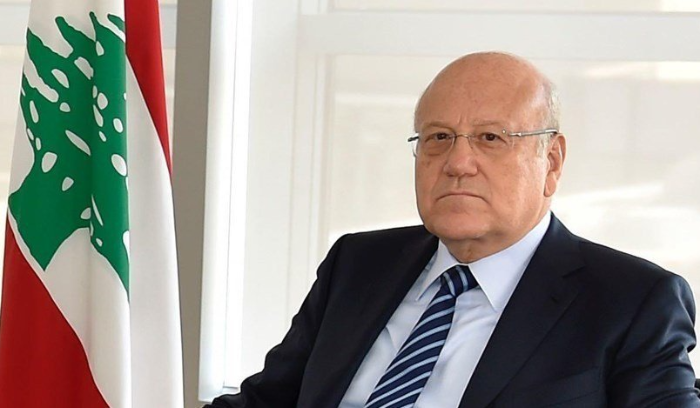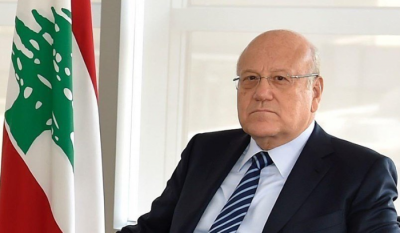The direct intervention of Prime Minister Najib Mikati in the escalating dispute between judicial authorities and the financial sector has opened the gate for containing the financial repercussions arising from this conflict. Meanwhile, the Lebanese presidency has denied any attempts to link its role with the judicial actions taken against several banks, deeming such claims as "the pinnacle of forgery, defamation, and deception."
The crisis between the judiciary and banks had threatened to escalate, warning of a potential bank closure starting early next week, along with renewed speculative attacks on the Lebanese pound due to a contraction in cash liquidity. However, political action has significantly absorbed this escalation, as a key aspect of Mikati's initiative emerged during his meeting with Minister of Justice Henry Khoury, agreeing to ask the public prosecutor, Judge Ghassan Oueidat, to take the appropriate actions regarding this matter.
Lebanese President Michel Aoun noted that "the media campaigns that have intensified in the past two days, which attempted to link the role of the presidency with the judicial actions taken against several banks, are the ultimate in forgery, defamation, and misleading, and are a confirmed result of the chaos Lebanon is experiencing at various levels, with a persistent effort to undermine state institutions and applicable laws."
Aoun affirmed that "all that has been published in the media about 'confrontations' between the presidency and banking officials is a figment of imagination aimed at politicizing this purely judicial issue and fabricating fictitious battles linked falsely to the upcoming parliamentary elections scheduled for May 15." He added: "The presidency has never intervened in the judiciary’s work and respects its independence, having no relation to the procedures being taken. However, it continues to follow up on the forensic audit of Lebanon's Central Bank accounts in implementation of the law issued in this regard, as part of the fight against corruption and the disclosure of those responsible for the financial collapse that the state has suffered."
Aoun pointed out that "all this confusion could be avoided by approving a financial recovery plan in agreement with the International Monetary Fund, which includes enacting a capital control law that the government must expedite achieving."
Political contacts succeeded in containing the repercussions of the banking-judiciary clash, and data indicates that political intervention is expanding to calm the current conflict. The banking topic was included as a main item in a special session convened by the Cabinet today (Saturday), with the proposed formula limiting banking-related judicial matters to the public prosecutor while respecting protocols and confidentiality obligations "regardless of the uproars that harm the reputation of the individuals and institutions concerned."
Banking leaders were not isolated from these developments. Sources told "Asharq Al-Awsat" that the recent escalation, with the sixth bank chairman added to the list of those banned from traveling, "has contributed to activating and accelerating efforts to coordinate a settlement-exit with active political parties, while senior bankers are responding to the calls for easing tensions by maintaining continuous communication with the Prime Minister and his economic team, who have been urged to act urgently to prevent the issue from escalating reciprocally, with implications that exceed local market impacts and threaten financial transactions across borders and with correspondent banks."
Indeed, bank administrations that convened an emergency general assembly yesterday at the headquarters of Byblos Bank received the government's initiative positively but cautiously, and decided to empower the board of directors to make the appropriate decision after assessing the outcomes of their efforts and the direction of the government's decisions in today's session. They expressed satisfaction with the content of Mikati's statements, with the board planning to hold a press conference after tomorrow (Sunday) to disclose the final stance in light of developments.
Sources participating in the general assembly indicated that active banking leadership preferred a moderate approach and rational handling of the emerging conflict, as opposed to immediate calls for a general bank closure and placing full blame on certain judges. According to sources, the recommendations stated that "striking is a means, not an end," and thus "caution is needed to reveal the results of the Prime Minister's actions," along with "the importance of not causing any harm to the rights holders and their relationship with the banking apparatus."
Mikati's statements were notably pointed, indicating that "the course of events in some judicial areas leads to the creation of tensions that can have undesirable consequences, and there are attempts to exploit this tension in electoral campaigns, which is a dangerous matter we have previously warned about." He emphasized that "the commitment to judicial independence and not interfering in judicial matters is matched by a commitment to the stability of conditions in the country in all respects, especially financially."
During his meeting with the Minister of Justice, Mikati stated: "It is the right of the judiciary to investigate any financial or banking file, particularly the recovery of depositors' rights, which is the top priority in all negotiations we conduct with the International Monetary Fund and all relevant bodies. However, using populist and police-style methods in investigations harms the judiciary first and the entire banking system second."
He added: "From this standpoint, we renew our request to the relevant judicial authorities to take the initiative to correct what is happening, according to known protocols, and push towards a return to the principle of confidentiality, and not leave matters in a state that will have devastating repercussions on the judiciary first and on one of the economic pillars in Lebanon, which will play a vital role in the process of recovery."
Concurrently, the intensity of the judicial-banking dispute and the dissemination of information about banks planning to implement the warning closure decision early next week led to an increase in the dollar exchange rate against the local pound in parallel markets, with the dollar price experiencing successive jumps, reaching approximately 23,500 pounds in the afternoon, compared to around 20,800 pounds per dollar on the platform managed by the central bank in conjunction with banks and major currency exchange companies.
Active sources in the parallel market expect that successful efforts to contain the dispute will cool these speculations and return price margins to levels closer to the exchange rate on the central bank's platform. However, if there is a setback, "the picture will be completely different," given the extreme sensitivity surrounding transactions related to developments that deepen the prevailing state of "uncertainty" among market participants.




